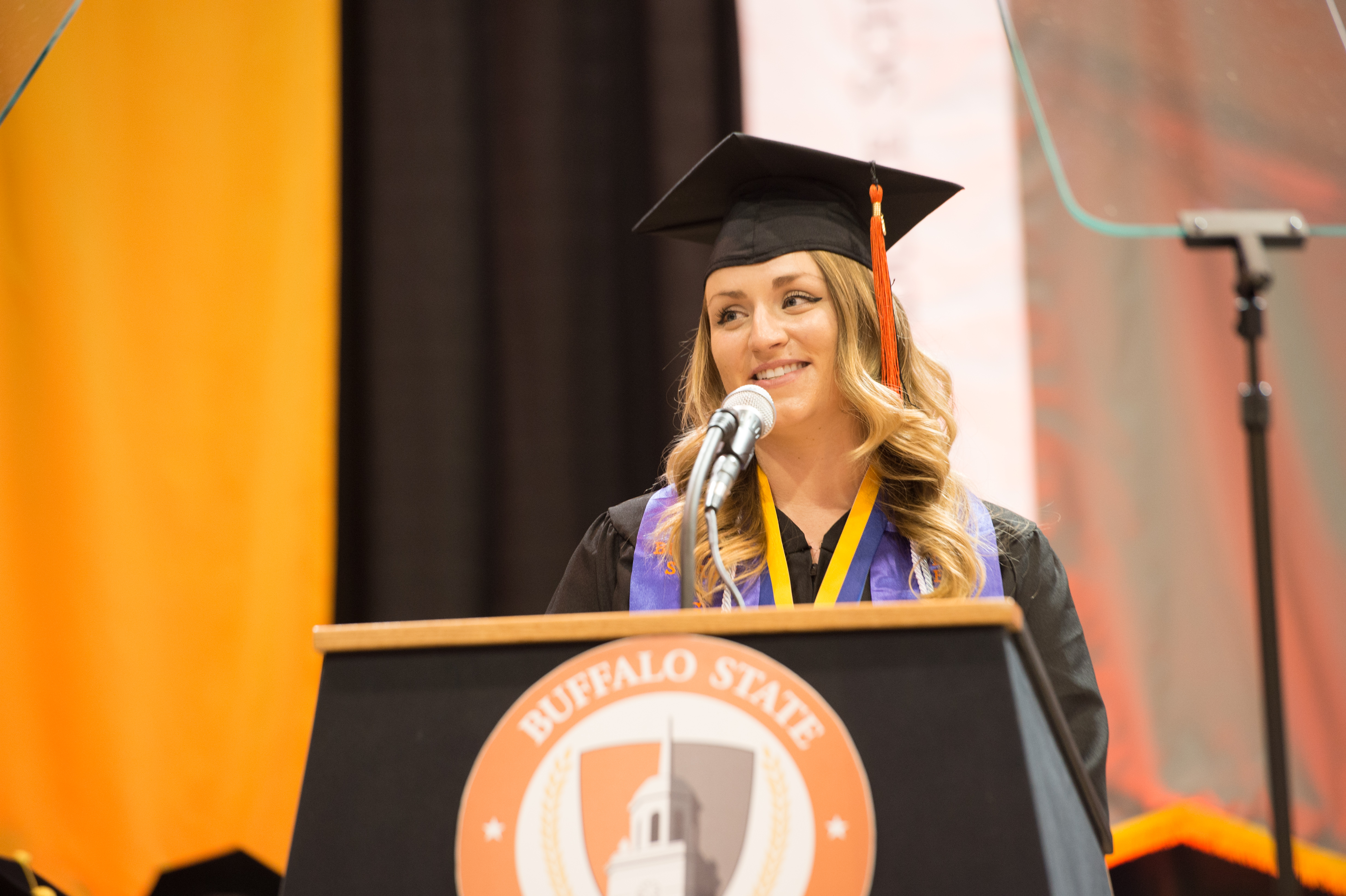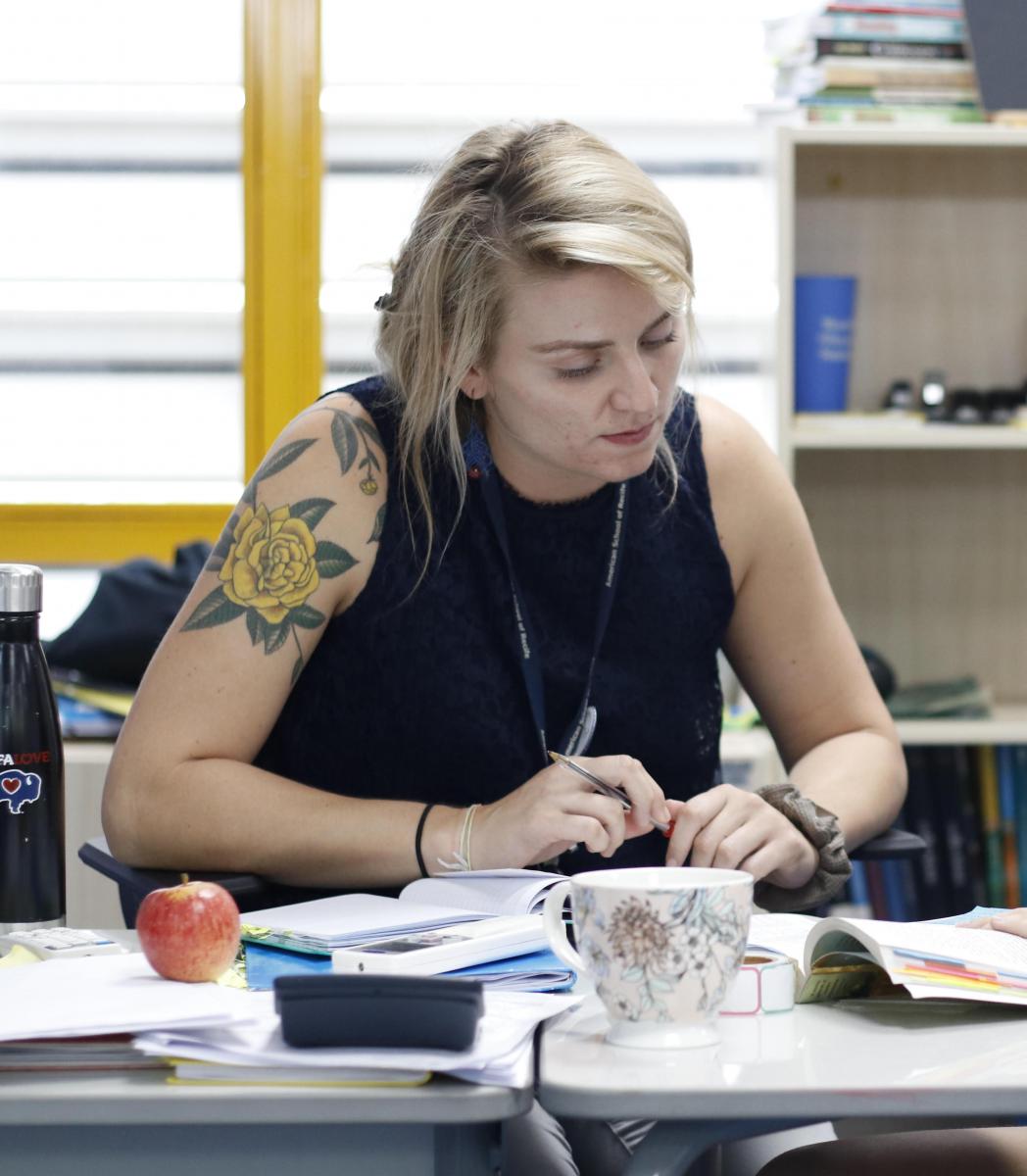Updated March 19, 2020 by Molly Rutter, SOE Graduate Assistant (original post September 9, 2016)

Ashley, English Education graduate, has been encouraged by Buffalo State faculty to travel extensively on her quest to become a global educator ready to engage students from every background and culture.
Ashley received the SUNY Chancellor's Award for Student Excellence and the President's Medal for Outstanding Graduate student, and she delivered the 2016 graduate student commencement address. She was the first teacher education student to participate in the Anne Frank Project's annual visit to Rwanda, and was selected as a Fulbright Student Scholar to teach in Rwanda in fall 2016.
After graduation, Weselak taught at an English immersion summer camp in Italy, as well as an international school in Santo Domingo, Dominican Republic. Currently, she is working as an English Teacher at an international school in Recife, Brazil.
In the following interview, Weselak shares how her experiences abroad have transformed her life and career.
Why did you choose a career in English education?
I chose my career a long time ago! I grew up reading a lot. My grandmother would read Mr. Giggles to me, and my parents would reward me with trips to the library. So, reading was always presented as something enjoyable to me. I loved reading with others, and I especially found how others interpreted literature to be fascinating. I knew I wanted to continue sharing literature with others as a career.
However, in college, I realized I was meant to interpret the literature myself. I hit my most frustrating lows while studying abroad at The University of Nottingham, England, where the professors pushed me to realize something new about a text, something never published or thought of before. I received so many 100s in the past for my writing, for studying someone else’s interpretation and regurgitating it. I felt incredibly ill-suited to study literature, but after my first paper, I felt empowered having finally said something of my own.
After my semester abroad, I returned to Buffalo State with a new unnamed perspective on literature. I started tutoring Lafayette students after school and found the anger and frustration of a young Burmese student further push this perspective to the tip of my tongue. He was upset that the story Of Mice and Men was mainly about friendship, where all he could notice was the poor treatment of Crooks. It reminded me of the silent frustration I had regarding Curly’s wife when I read it in high school. Her name is just Curly’s wife! I couldn’t get over it in high school, but it wasn’t mentioned in class, so I figured it wasn’t a worthwhile thought.
I started my courses with Dr. Cercone, and he gave this perspective a name - literacy. It isn’t the text itself, but rather, it’s how we read the text. Dr. Cercone inspired and showed me how to encourage this perspective in my teaching. He says, “English Teachers Change the World,” and while it might make some roll their eyes, it certainly changed my world.
My favorite part of my job is hearing the ideas and analysis from the students. I’m surprised daily by the minds of these young adults, and I love the way they challenge me to think differently about our world.

What inspired you to travel?
I've always loved learning about other cultures and ways of thinking. I think this was partially inspired by my love of reading, but now that magic of mentally escaping and thinking differently can be done physically and in real life. Now that I'm learning new languages, I've become so interested in the history of our words.
Ireland was my first time leaving the country, and it is what started this growing love of traveling. I'm glad my first time abroad was with a native, Laurence Shine, who showed us the authentic Ireland with his stories and experiences. I realized I don't want to simply be a tourist. I want to feel the soul of the country. Now, I try to live as much as possible in the country to get these little tastings. My work in Italy at an English immersion summer camp was a mere three months, but I lived with host families who shared their customs with me. Ireland captured me, and it was an exceptional experience that made me realize how beautiful people can be in the world.
What service or volunteer work had an impact on you while abroad?
While living in Rwanda under my Fulbright, I volunteered with Kuzamura Ubuzima, a program that feeds patients at the local hospital. Hospitals don't provide food for the patients, so patients must rely on family and friends. This program created a farm on the hospital grounds and pro
vided meals for patients who are malnourished or living in poverty. The patient's caretaker, if available, will help out in the kitchen as a "payment" for the service. Volunteering with this organization was by far my most meaningful time in Rwanda. I felt really close to Rwandans.
What are some of the greatest challenges of living and working internationally?
The loneliness can be very hard, being away from family and close friends. It's relatively easy to make friends abroad, especially with your fellow expats, but it's hard to get to the same deep level as the friends you have at home. My biggest worry is losing the closeness I have with so many people back in Buffalo. However, being abroad does make me cherish the time I have with them even more. I probably see some of my family more often now that I'm abroad than I did while living at home! Being abroad makes you prioritize your time with them.
How have your experiences abroad affected you personally?
I've become more empathetic, especially to language learners and immigrants. I've worked with immigrants and refugees in the USA before, but I never felt the same humbling moment as I had while living abroad, where you can't express yourself fully, or you make cultural errors. I am a white American woman, so I recognize that I'm treated better than many of the immigrants in the USA, but overall it has been incredibly humbling to feel these frustrations and sadness. I've also started learning jiu-jitsu because of an incident in Uganda, which made me realize that women abroad need to know the basics of self-defense.
Overall, I think being abroad has made me fall in love more with humanity. Once you get over the exciting thrills, you realize that humans are more-or-less the same everywhere. Once the exoticness wears off, you see that everyone is both enjoying and struggling through life. We're all so complex and exciting. I've loved witnessing little slivers of humanity in each country.
How have your international experiences affected you as an educator?
Teaching children from different cultures and different socioeconomic statuses has made me realize how important it is that we let our students interpret the work themselves. My students share ideas about texts that I would never have guessed because of their different lives. They're always teaching me!
In Brasil I feel supported, but also encouraged to make my own professional decisions in my teaching methods. I feel like I'm allowed to focus on my students first and data second.
What advice would you give to future teachers who are considering working internationally?
Do your research into what communities you want to join before you arrive in the country. I experienced the "expat blues" in all the places I've traveled except Brasil because I was prepared! It is not until you busy yourself and put yourself in a community that you start to feel valued and welcomed. For example, I knew I wanted to continue jiu-jitsu (of course, Brasil is home to it), and that I wanted to learn more dance styles. So, I found a BJJ academy and a dance school months before I arrived. I messaged them on Instagram and my first lesson within a week of my arrival. I got right into the communities and so I didn't experience the expat blues! I found immediate local friends and support. I recommend doing this!
Some content on this page is saved in PDF format. To view these files, download Adobe Acrobat Reader free. If you are having trouble reading a document, request an accessible copy of the PDF or Word Document.
